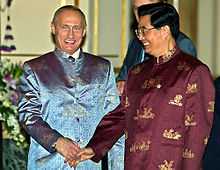Foreign policy of Vladimir Putin
 |
| This article is part of a series on the politics and government of Russia |
|
|
|
|
|
Related topics
|
|
Politics portal |
The foreign policy of Vladimir Putin concerns the policies of Russia's president Vladimir Putin vis-a-vis other nations. He held office from 2000 to 2008, and assumed power again in 2012.
As of late 2013, Russian-American relations were at a low point.[1] The United States canceled a summit (for the first time since 1960), after Putin gave asylum to Edward Snowden. Washington regarded Russia as obstructionist and a spoiler regarding Syria, Iran, Cuba and Venezuela. In turn, those nations look to Russia for protection against the United States.[1] Europe needs Russian gas, but worries about interference in the affairs of Eastern Europe. Russia remains angry over the expansion of NATO into Eastern Europe. Central Asia sees Moscow as a former overlord, which is too powerful to ignore, even as countries assist American involvement in Afghanistan. In Asia, India has moved from a close ally of the Soviet Union to a partner of the United States with strong nuclear and commercial ties. Japan and Russia remain at odds over the ownership of the Kurile islands; this dispute has hindered cooperation for decades.[1] China has moved from a client state of Russia in the 1950s, to a bitter antagonist in the 1960s and 1970s, to a situation where its economic powerhouse sees Russia as a source of raw materials, as well as an ally in the United Nations.[1]
In 2014, with NATO's decision to suspend practical co-operation with Russia and all major Western countries' decision to impose a host of sanctions against Russia, in response to the Russian military intervention in Ukraine, Putin's Russia's relationship with the West came to be characterized as assuming an adversarial nature, or the advent of Cold War II.[2][3][4]
Notable foreign policy speeches by Putin
At the Munich Conference on Security Policy on 12 February 2007, Putin rejected the concept of a unipolar world, recalled the history of nuclear arms control, touched on the Treaty on Conventional Armed Forces in Europe, and spoke about the challenges that faced the Organisation for Security and Cooperation in Europe:[5]
| “ | I consider that the unipolar model is not only unacceptable but also impossible in today's world. And this is not only because if there was individual leadership in today's - and precisely in today's - world, then the military, political and economic resources would not suffice. What is even more important is that the model itself is flawed because at its basis there is and can be no moral foundations for modern civilisation.
Unilateral and frequently illegitimate actions have not resolved any problems. Moreover, they have caused new human tragedies and created new centres of tension. Judge for yourselves: wars as well as local and regional conflicts have not diminished. Mr Teltschik mentioned this very gently. And no less people perish in these conflicts - even more are dying than before. Significantly more, significantly more! Today we are witnessing an almost uncontained hyper use of force - military force - in international relations, force that is plunging the world into an abyss of permanent conflicts. As a result we do not have sufficient strength to find a comprehensive solution to any one of these conflicts. Finding a political settlement also becomes impossible. |
” |
| “ | As is well-known, the Organisation for Security and Cooperation in Europe (OSCE) was created to examine all - I shall emphasise this - all aspects of security: military, political, economic, humanitarian and, especially, the relations between these spheres.
What do we see happening today? We see that this balance is clearly destroyed. People are trying to transform the OSCE into a vulgar instrument designed to promote the foreign policy interests of one or a group of countries. And this task is also being accomplished by the OSCE's bureaucratic apparatus which is absolutely not connected with the state founders in any way. Decision-making procedures and the involvement of so-called non-governmental organisations are tailored for this task. These organisations are formally independent but they are purposefully financed and therefore under control. According to the founding documents, in the humanitarian sphere the OSCE is designed to assist country members in observing international human rights norms at their request. This is an important task. We support this. But this does not mean interfering in the internal affairs of other countries, and especially not imposing a regime that determines how these states should live and develop. |
” |
On 12 December 2013, Putin used his annual Address to the Federal Assembly, which was delivered on the 20th anniversary of the Russian Constitution, to state that[6]
| “ | No one should entertain any illusions about achieving military superiority over Russia; we will never allow it. Russia will respond to all these challenges, both political and technological. We have all we need in order to do so. | ” |
- the Crimean speech (March 18, 2014)
- the Valdai speech (24 October 2014 in Sochi city; analysts consider it a follow-up to Putin's 2007 Munich speech where he began to outline his views on world order) and
- another Crimean speech, delivered on December 4, 2014.[7]
Relations with NATO and its member nations
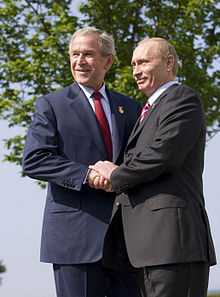
After the 9/11 attacks, Putin was quick to support the U.S. in the War on Terror, thus creating an opportunity for deepening the relationship with the leading Western and NATO power.[8] However, the U.S. chose to proceed with further expansion of NATO to Russia's borders at the 2002 Prague summit and to unilaterally withdraw in 2001 from the 1972 Anti-Ballistic Missile Treaty.[8] Since 2003, when Russia did not support the Iraq War and when Putin became ever more distant from the West in his internal and external policies, the relations continued to deteriorate. According to Russia scholar Stephen F. Cohen, the narrative of the mainstream U.S. media, following that of the White House, became profoundly anti-Putin, full of accusations that Putin had caused problems which actually stem from the 1990s, and assertions that Putin was personally responsible for any murders of his Russian political opponents, such as the journalist Anna Politkovskaya and the supposed KGB defector in London, Aleksandr Litvinenko.[8] In an interview with Michael Stürmer, Putin was quoted saying that there were three questions which most concerned Russia and Eastern Europe; namely the status of Kosovo, the Conventional Forces in Europe treaty and American plans to build missile defence sites in Poland and the Czech Republic, and suggested that all three were some way linked.[9] In Putin's view, concessions on one of these questions on the Western side might be met with concessions from Russia on another.[9]
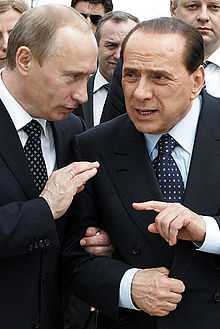
In February 2007, at the annual Munich Conference on Security Policy, Putin openly criticized what he called the United States' monopolistic dominance in global relations, and "almost uncontained hyper use of force in international relations". He said the result of it is that "no one feels safe! Because no one can feel that international law is like a stone wall that will protect them. Of course such a policy stimulates an arms race."[10] In this speech, which became known as Munich Speech, Putin called for a "fair and democratic world order that would ensure security and prosperity not only for a select few, but for all".[10] His remarks however were met with criticism by some delegates[11] such as former NATO secretary Jaap de Hoop Scheffer who called his speech, "disappointing and not helpful."[12] Previously, in a January 2007 interview Putin said Russia is in favor of a democratic multipolar world and of strengthening the systems of international law.[13] The months following Putin's Munich speech[10] were marked by tension and a surge in rhetoric on both sides of the Atlantic. Both Russian and American officials, however, denied the idea of a new Cold War.[14] Then US Secretary of Defense Robert Gates said on the Munich Conference: "We all face many common problems and challenges that must be addressed in partnership with other countries, including Russia. ... One Cold War was quite enough."[15] Vladimir Putin said prior to 33rd G8 Summit, on June 4: "we do not want confrontation; we want to engage in dialogue. However, we want a dialogue that acknowledges the equality of both parties’ interests."[16]
In June 2007, when answering a question about whether Russian nuclear forces might be focused on European targets in case "the United States continued building a strategic shield in Poland and the Czech Republic", Putin admitted: "if part of the United States’ nuclear capability is situated in Europe and that our military experts consider that they represent a potential threat, then we will have to take appropriate retaliatory steps. What steps? Of course we must have new targets in Europe."[16][17][18]
Putin continued his public opposition of a U.S. missile shield in Europe, and presented President George W. Bush with a counterproposal on June 7, 2007 of sharing the use of the Soviet-era radar system in Azerbaijan rather than building a new system in the Czech Republic. Putin expressed readiness to modernize the Gabala radar station, which has been in operation since 1986. Putin proposed it would not be necessary to place interceptor missiles in Poland then, but interceptors could be placed in NATO member Turkey or Iraq. Putin suggested also equal involvement of interested European countries in the project.[19]
In his annual address to the Federal Assembly on 26 April 2007, Putin announced plans to declare a moratorium on the observance of the CFE Treaty by Russia until all NATO members ratified it and started observing its provisions, as Russia had been doing on a unilateral basis. Putin argues that as new NATO members have not even signed the treaty so far, an imbalance in the presence of NATO and Russian armed forces in Europe creates a real threat and an unpredictable situation for Russia.[20] NATO members said they would refuse to ratify the treaty until Russia complied with its 1999 commitments made in Istanbul whereby Russia should remove troops and military equipment from Moldova and Georgia. Russian Foreign Minister Sergey Lavrov was quoted as saying in response that "Russia has long since fulfilled all its Istanbul obligations relevant to CFE".[21] Russia has suspended its participation in the CFE as of midnight Moscow time on December 11, 2007.[22][23] On December 12, 2007, the United States officially said it "deeply regretted the Russian Federation's decision to 'suspend' implementation of its obligations under the Treaty on Conventional Armed Forces in Europe (CFE)." State Department spokesman Sean McCormack, in a written statement, added that "Russia's conventional forces are the largest on the European continent, and its unilateral action damages this successful arms control regime."[24] NATO's primary concern arising from Russia's suspension is that Moscow could now accelerate its military presence in the Northern Caucasus.[25]
The months following Putin's Munich speech[10] were marked by tension and a surge in rhetoric on both sides of the Atlantic. So, Vladimir Putin said at the anniversary of the Victory Day, "these threats are not becoming fewer but are only transforming and changing their appearance. These new threats, just as under the Third Reich, show the same contempt for human life and the same aspiration to establish an exclusive dictate over the world."[26] This was interpreted by some Russian and Western commentators as comparing the U.S. to Nazi Germany. On the eve of the 33rd Summit of the G8 in Heiligendamm, American journalist Anne Applebaum, who is married to a Polish politician, wrote that "Whether by waging cyberwarfare on Estonia, threatening the gas supplies of Lithuania, or boycotting Georgian wine and Polish meat, he [Putin] has, over the past few years, made it clear that he intends to reassert Russian influence in the former communist states of Europe, whether those states want Russian influence or not. At the same time, he has also made it clear that he no longer sees Western nations as mere benign trading partners, but rather as Cold War-style threats."[27]
Putin strongly opposed the secession of Kosovo from Serbia. He called any support for this act "immoral" and "illegal".[28] He described Kosovo's declaration of independence a "terrible precedent" that will come back to hit the West "in the face".[29] He stated that the Kosovo precedent will de facto destroy the whole system of international relations, developed over centuries.[30]
Putin's relations with former American President George W. Bush, former German Chancellor Gerhard Schröder, former French President Jacques Chirac, and Italian Prime Minister Silvio Berlusconi were reported to be personally friendly. Putin's "cooler" and "more business-like" relationship with Germany's subsequent Chancellor, Angela Merkel is often attributed to Merkel's upbringing in the former DDR, where Putin was stationed when he was a KGB agent.[31]
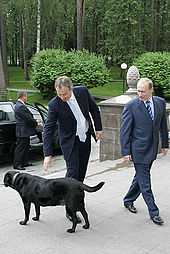
By mid-2000s (decade), the relations between Russia and the United Kingdom deteriorated when the United Kingdom granted political asylum to Putin's former patron, oligarch Boris Berezovsky in 2003.[32] Berezovsky, located in London, often called for the overthrow of Putin[32] and allegedly directed anti-Putin activities in Russia. The United Kingdom also granted asylum to the Chechen rebel leader Akhmed Zakayev and other notable persons who had fled Russia.
In 2006, it became known that Britain spied on Russia using a fake rock, which was located on a street and contained electronic equipment that allowed British diplomats to receive and transmit information.[33] The Russian security service FSB linked the rock with allegations that British were making secret payments to pro-democracy and human rights groups, and the same year President Putin introduced a law which restricted non-governmental organisations (NGOs) from getting funding from foreign governments. This resulted in many NGOs closing.[33] In 2006, the Russian liberal opposition met the media reports on "spy rock" with contempt, alleging that it was made-up by FSB,[34] but in 2012 Jonathan Powell, ex-chief of staff of the U.K. Prime Minister Tony Blair, confessed that the story with the rock was true.[33]
The end of 2006 brought strained relations between Russia and Britain in the wake of the death of Alexander Litvinenko in London by poisoning. On 20 July 2007, the Gordon Brown government expelled "four Russian envoys over Putin's refusal to extradite ex-KGB agent Andrei Lugovoi, wanted in the UK for the murder of fellow former spy Alexander Litvinenko in London."[32] The Russian government, among other things, said it would suspend issuing visas to UK officials and froze cooperation on counterterrorism in response to Britain suspending contacts with their Federal Security Service.[32] Alexander Shokhin, president of the Russian Union of Industrialists and Entrepreneurs warned that British investors in Russia will "face greater scrutiny from tax and regulatory authorities. [And] They could also lose out in government tenders". Some saw the crisis as arising from a dispute over Britain's decision to grant Putin's former patron, Russian billionaire Boris Berezovsky, political asylum in 2003. Earlier in 2007, Berezovsky had called for the overthrow of Putin.[32] On December 10, 2007, Russia ordered the British Council to halt work at its regional offices in what was seen as the latest round of a dispute over the murder of Alexander Litvinenko; Britain said Russia's move was illegal.[35]
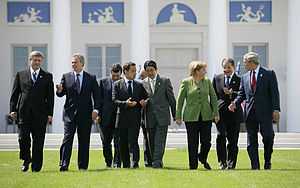
In October 2007, at a press conference following the 20th Russia-EU Summit in Portugal, Putin proposed creating a Russian-European Institute for Freedom and Democracy headquartered either in Brussels or in one of the European capitals, and added that "we are ready to supply funds for financing it, just as Europe covers the costs of projects in Russia".[36] This newly proposed institution is expected to monitor human rights violations in Europe and contribute to development of European democracy.[37]
On 1st April 2014, NATO decided to suspend practical co-operation with Russia, in response to the Ukraine crisis.[38]
Relations with South and East Asia
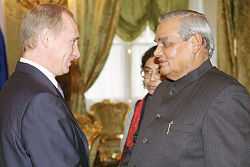
During his first and second term in office, bilateral trade turnover between India and Russia was modest and stood at US$ 3 billion, of which Indian exports to Russia were valued at US$ 908 million. The major Indian exports to Russia are pharmaceuticals; tea, coffee and spices; apparel and clothing; edible preparations; and engineering goods. Main Indian imports from Russia are iron and steel; fertilisers; non-ferrous metals; paper products; coal, coke & briquettes; cereals; and rubber. Indo-Russian trade is expected to reach US$10 billion by 2010. Putin wrote in an article in the Hindu, "The Declaration on Strategic Partnership between India and Russia signed in October 2000 became a truly historic step".[39][40] Prime Minister Manmohan Singh also agreed with his counterpart by stated in speech given during President Putin's 2012 visit to India, "President Putin is a valued friend of India and the original architect of the India-Russia strategic partnership".[41] Both countries closely collaborate on matters of shared national interest these include at the UN, BRICS, G20 and SCO where India has observer status and has been asked by Russia to become a full member.[42] Russia also strongly supports India receiving a permanent seat on the United Nations Security Council. In addition, Russia has vocally backed India joining the NSG[43] and APEC.[44] Moreover, it has also expressed interest in joining SAARC with observer status in which India is a founding member.[45][46]
Russia currently is one of only two countries in the world (the other being Japan) that has a mechanism for annual ministerial-level defence reviews with India.[47] The Indo-Russian Inter-Governmental Commission (IRIGC), which is one of the largest and comprehensive governmental mechanisms that India has had with any country internationally. Almost every department from the Government of India attends it.[47]
Putin's Russia maintains strong and positive relations with other BRIC countries. The country has sought to strengthen ties especially with the People's Republic of China by signing the Treaty of Friendship as well as building the Trans-Siberian oil pipeline geared toward growing Chinese energy needs.[48] The mutual-security cooperation of the two countries and their central Asian neighbours is facilitated by the Shanghai Cooperation Organisation which was founded in 2001 in Shanghai by the leaders of China, Kazakhstan, Kyrgyzstan, Russia, Tajikistan, and Uzbekistan.
Following the Peace Mission 2007 military exercises jointly conducted by the Shanghai Cooperation Organisation (SCO) member states, Putin announced on 17 August 2007 the resumption on a permanent basis of long-distance patrol flights of The Russian Air Force Tu-95 and Tu-160 strategic bombers that had been suspended since 1992.[49][50] US State Department spokesman Sean McCormack was quoted as saying in response that "if Russia feels as though they want to take some of these old aircraft out of mothballs and get them flying again, that's their decision."[50] The announcement made during the SCO summit in the light of joint Russian-Chinese military exercises, first-ever in history to be held on Russian territory,[51] made some believe that Putin is inclined to set up an anti-NATO bloc or the Asian version of OPEC.[52] When presented with the suggestion that "Western observers are already likening the SCO to a military organisation that would stand in opposition to NATO", Putin answered that "this kind of comparison is inappropriate in both form and substance".[49] Russian Chief of the General Staff Yury Baluyevsky was quoted as saying that "there should be no talk of creating a military or political alliance or union of any kind, because this would contradict the founding principles of SCO".[51]
The resumption of long-distance flights of Russia's strategic bombers was followed by the announcement by Russian Defense Minister Anatoliy Serdyukov during his meeting with Putin on December 5, 2007, that 11 ships, including the aircraft carrier Kuznetsov, would take part in the first major navy sortie into the Mediterranean since Soviet times.[53] The sortie was to be backed up by 47 aircraft, including strategic bombers.[54] According to Serdyukov, this was an effort to resume regular Russian naval patrols on the world's oceans, the view that was also supported by Russian media.[55] The military analyst from Novaya Gazeta Pavel Felgenhauer said that the accident-prone Kuznetsov was scarcely seaworthy and was more of a menace to her crew than any putative enemy.[56]
Relations with Middle Eastern and North African countries
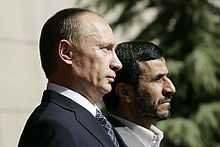
On 16 October 2007 Putin visited Iran to participate in the Second Caspian Summit in Tehran,[57][58] where he met with Iranian President Mahmoud Ahmadinejad.[59] Other participants were leaders of Azerbaijan, Kazakhstan, and Turkmenistan.[60] This was the first visit of a Soviet or Russian leader to Iran since Joseph Stalin's participation in the Tehran Conference in 1943, and thus marked a significant event in Iran-Russia relations.[61] At a press conference after the summit Putin said that "all our (Caspian) states have the right to develop their peaceful nuclear programmes without any restrictions".[62] During the summit it was also agreed that its participants, under no circumstances, would let any third-party state use their territory as a base for aggression or military action against any other participant.[57]
Subsequently, under Medvedev's presidency, Iran-Russia relations were uneven: Russia did not fulfill the contract of selling to Iran the S-300, one of the most potent anti-aircraft missile systems currently existing. However, Russian specialists completed the construction of Iran and the Middle East's first civilian nuclear power facility, the Bushehr Nuclear Power Plant, and Russia has continuously opposed the imposition of economic sanctions on Iran by the U.S. and the EU, as well as warning against a military attack on Iran. Putin was quoted as describing Iran as a "partner",[9] though he expressed concerns over the Iranian nuclear programme.[9]
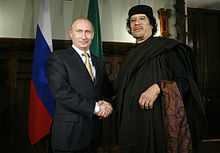
In April 2008, Putin visited Libya where he met the leader Muammar Gaddafi, the country welcomed the idea of creating an OPEC-like group of gas-exporting countries, Putin became first Russian President who visited Libya, he remarked the visit as "We are satisfied about the way in which we resolved this problem. I am absolutely convinced that the solution we have found will help the Russian and Libyan economies."[63] Putin condemned the foreign military intervention of Libya, he called UN resolution as "defective and flawed," and added "It allows everything. It resembles medieval calls for crusades.",[64] During the whole event, Putin condemned other steps taken by NATO.[65] Upon the death of Muammar Gaddafi, Putin called it as "planned murder" by US, he asked "They showed to the whole world how he (Gaddafi) was killed," and "There was blood all over. Is that what they call a democracy?"[66][67]
Dmitri Trenin reports in the New York Times that from 2000 to 2010 Russia sold around $1.5 billion worth of arms to Syria, making Damascus Moscow’s seventh-largest client.[68] During the Syrian civil war, Russia threatened to veto any sanctions against the Syrian government,[69] and continued to supply arms to the regime.
Putin opposed any foreign intervention. On 1 June 2012, in Paris, he rejected the statement of French President Francois Hollande who called on Bashar Al-Assad to step down. Putin echoed the argument of the Assad regime that anti-regime ’’militants’’ were responsible for much of the bloodshed, rather than the shelling by Syrian forces and the civilian killings attributed by survivors and Western governments toregime supporters. He asked "But how many of peaceful people (sic) were killed by so-called militants? Did you count? There are also hundreds of victims." He also talked about previous NATO interventions and their results, and asked "What is happening in Libya, in Iraq? Did they become safer? Where are they heading? Nobody has an answer."[70]
On 11 September 2013, an opinion, written by Putin, was published in the New York Times regarding international events related to the United States, Russia and Syria.[71]
Relations with post-Soviet states
A series of so-called color revolutions in the post-Soviet states, namely the Rose Revolution in Georgia in 2003, the Orange Revolution in Ukraine in 2004 and the Tulip Revolution in Kyrgyzstan in 2005, led to frictions in the relations of those countries with Russia. In December 2004, Putin criticised the Rose and Orange Revolution, according to him: "If you have permanent revolutions you risk plunging the post-Soviet space into endless conflict".[72] During the protests following the 2011 Russian elections (in December 2011) Putin named the Orange Revolution an infamous foreknowledge for Russia.[73]
Apart from a clash of nationalist rhetorics with the common historical legacies of the Soviet Union and the Russian Empire, a number of economic disputes erupted between Russia and some neighbours, such as the 2006 Russian ban of Moldovan and Georgian wines. Moscow's policies under Putin towards these states are viewed by politicians in the West as "efforts to bully democratic neighbors".[74]
In some cases, such as the Russia–Ukraine gas disputes, the economic conflicts affected other European countries, for example when a January 2009 gas dispute with Ukraine led state-controlled Russian company Gazprom to halt its deliveries of natural gas to Ukraine,[75] which left a number of European states, to which Ukraine transits Russian gas, to have serious shortages of natural gas in January 2009.[75] In an interview with the German historian Michael Stürmer about the Russian shut-down of gas to Ukraine in early 2005, Putin linked the shut-down to the Orange revolution, saying: "This has a price [the Orange revolution]. In spite of so much frustration we have stabilized the situation. In old days we concluded agreements with Ukraine year after year, and then included transit fees. The West Europeans had no idea that their energy security was a cliffhanger. By now we have a five-year agreement for transit to the E.U. This is an important step in the direction of European energy security".[9]
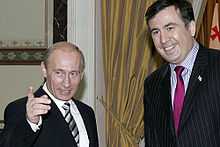
The disputes typically arose because of inabilities of Ukraine to pay higher prices for natural gas and pay debts in time. In 2009, the Russia–Ukraine dispute was resolved by a long-term agreement on price formula, agreed by Prime Ministers Vladimir Putin of Russia and Prime Minister of Ukraine Yulia Tymoshenko[75][76] (later, when the rising global oil prices prompted the rising gas prizes[77] the agreement turned very unfavourable for Ukraine; in October 2011 Tymoshenko was found guilty of abuse of office when brokering the 2009 deal and was sentenced to seven years in prison).[78]
The plans of Georgia and Ukraine to become members of NATO have caused some tensions between Russia and those states. In 2010, Ukraine did abandon these plans.[79] In public Putin has stated that Russia has no intention of annexing any country.[72]
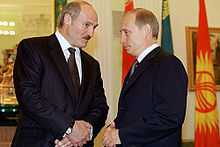
Putin, in his relations with Russo-centric neighbor and former Soviet Republic Belarus, continued the general trend towards closer bi-lateral ties between the two countries, which has thus far stopped short of extending the depth of the Union of Russia and Belarus proposed and speculated by many media outlets both inside and outside Russia.[80]
In August 2008, Georgian President Mikheil Saakashvili attempted to restore control over the breakaway South Ossetia, claiming this action was in response to Ossetian border attacks on Georgians and to alleged buildups of Russian non-peacekeeping forces. Russian peacekeepers stationed there came under attack during the invasion and fought alongside the South Ossetians as Georgian troops pushed into the province and seized most of the capital of Tskhinvali. However, the Georgian military was soon defeated in the resulting 2008 South Ossetia War after regular Russian forces entered South Ossetia and then Georgia proper, and also opened a second front in the other Georgian breakaway province of Abkhazia together with Abkhazian forces.[81][82] During this conflict, according to high level French diplomat Jean-David Levitte, Putin intended to depose the Georgian President Mikheil Saakashvili and declared: "I am going to hang Saakashvili by the balls".[83]
Putin blamed the 2008 war and the bad relations between Russia and Georgia as "the result of the policy that the Georgian authorities conducted back then and still attempt to conduct now"; he stated that Georgia is a "brotherly nation that hopefully will finally understand that Russia is not an enemy, but is a friend and the relations will be restored"[84] (one month before Georgian President Saakashvili had stated "Putin has a problem with Georgian people, but not with Georgian government").[85] Putin stated in 2009 Georgia could have kept Abkhazia and South Ossetia "within its territory" if it had treated the residents of Abkhazia and South Ossetia "with respect" (he claims they did "the opposite").[86]
During the 2004 Ukrainian presidential election, Putin twice visited Ukraine before the election to show his support for Ukrainian Prime Minister Viktor Yanukovych, who was widely seen as a pro-Kremlin candidate, and he congratulated him on his anticipated victory before the official election returns had been in. Putin's personal support for Yanukovych was criticized as unwarranted interference in the affairs of a sovereign state (See also The Orange revolution). According to a document uncovered during the United States diplomatic cables leak Putin “implicitly challenged" the territorial integrity of Ukraine at the April 4, 2008, NATO-Russia Council Summit in Bucharest, Romania.[87]
The President of Ukraine elected during the Orange Revolution, Viktor Yushchenko, was succeeded in 2010 by Viktor Yanukovych, that led to improved relations with Russia.[88] Russia was able to expand the lease for the base for its Black Sea Fleet base in the Ukrainian city Sevastopol in exchange for lower gas prices for Ukraine (the 2010 Ukrainian–Russian Naval Base for Natural Gas treaty).[89] The President of Kyrgyzstan since 2009, Almazbek Atambayev, wants to guide Kyrgyzstan towards the Customs Union of Belarus, Kazakhstan and Russia and has stated his country has a "common future" with its neighbours and Russia.[90]
Despite existing or past tensions between Russia and most of the post-Soviet states, Putin has followed the policy of Eurasian integration. The Customs Union of Belarus, Kazakhstan and Russia has already brought partial economic unity between the three states, and the proposed Eurasian Union is said to be a continuation of this customs union. Putin endorsed the idea of a Eurasion Union in 2011,[91][92][93][94] (the concept was proposed by the President of Kazakhstan in 1994).[95] On 18 November 2011, the presidents of Belarus, Kazakhstan and Russia signed an agreement, setting a target of establishing the Eurasian Union by 2015.[96] The agreement included the roadmap for the future integration and established the Eurasian Commission (modelled on the European Commission) and the Eurasian Economic Space, which started work on 1 January 2012.[96][97]
Intervention in Ukraine and annexation of Crimea
.jpeg)
As events came closer to crisis in Ukraine around February and March 2014, Putin answered the questions of reporters on this vital issue.[98] The residents of the province of Crimea decided in a referendum to ask for Russian protection on 16 March. On 18 March 2014 Putin made a well-publicized speech about the situation in Crimea.[99] Russia was excluded one week later from the G8 group as a result of its annexation of Crimea.[100]
Relations with Australasia, Latin America, and others

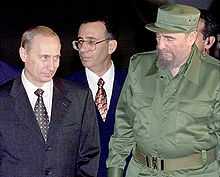
Putin and his successor Medvedev have enjoyed warm relations with Hugo Chávez of Venezuela. Much of this has been through the sale of military equipment; since 2005, Venezuela has purchased more than $4 billion worth of arms from Russia.[101] In September 2008, Russia sent Tupolev Tu-160 bombers to Venezuela to carry out training flights.[102] In November 2008, both countries held a joint naval exercise in the Caribbean.[103] Earlier in 2000, Putin had re-established stronger ties with Fidel Castro's Cuba.
In September 2007, Putin visited Indonesia and in doing so became the first Russian leader to visit the country in more than 50 years.[104] In the same month, Putin also attended the APEC meeting held in Sydney, Australia where he met with Australian Prime Minister John Howard and signed a uranium trade deal. This was the first visit by a Russian president to Australia.
General assessments by experts
The British historian Max Hastings in his 2007 article "Will we have to fight Russia in this Century?"[105] described Putin as "Stalin's spiritual heir". He went on to argue that while "a return to the direct military confrontation of the Cold War is unlikely", "the notion of Western friendship with Russia is a dead letter".[105]
The British academic Norman Stone in his 2007 article "No wonder they like Putin" compared Putin to General Charles de Gaulle.[106]
Adi Ignatius argued in 2007: "Putin... is not a Stalin. There are no mass purges in Russia today, no broad climate of terror. But Putin is reconstituting a strong state, and anyone who stands in his way will pay for it."[107]
See also
- List of presidential trips made by Vladimir Putin
- Cold War II
References and notes
- ↑ 1.0 1.1 1.2 1.3 Shuster, Simon. "The World According to Putin," Time Sept 16, 2013, pp 30-35
- ↑ Dmitri Trenin (March 4, 2014). "Welcome to Cold War II". Foreign Policy. Retrieved 26 December 2014.
- ↑ Mauldin, John (29 October 2014). "The Colder War Has Begun". Forbes. Retrieved 26 December 2014.
- ↑ Kendall, Bridget (12 November 2014). "Rhetoric hardens as fears mount of new Cold War". BBC News. Retrieved 26 December 2014.
- ↑ washingtonpost.com: Putin's Prepared Remarks at 43rd Munich Conference on Security Policy" 12 Feb 2007
- ↑ kremlin.ru: "Presidential Address to the Federal Assembly" 12 Dec 2013
- ↑ http://eng.kremlin.ru: Presidential Address to the Federal Assembly (full text)
- ↑ 8.0 8.1 8.2 America's Failed (Bi-Partisan) Russia Policy by Stephen F. Cohen, Huffington Post
- ↑ 9.0 9.1 9.2 9.3 9.4 Stuermer, Michael (2008). Putin and the Rise of Russia. London: Weidenfeld & Nicolson. pp. 55, 57 & 192. ISBN 9780297855101. Retrieved 11 June 2012.
- ↑ 10.0 10.1 10.2 10.3 43rd Munich Conference on Security Policy. Putin's speech in English, 10 February 2007.
- ↑ "Russia: Washington Reacts To Putin's Munich Speech". RFERL.
- ↑ Watson, Rob (10 February 2007). "Putin's speech: Back to cold war? Putin's speech: Back to cold war?". BBC.
- ↑ "Interview for Indian Television Channel Doordarshan and Press Trust of India News Agency, 18 January 2007". Kremlin.ru. Retrieved 2013-06-22.
- ↑ Munich Conference on Security Policy, As Delivered by Secretary of Defense Robert M. Gates, 11 February 2007
- ↑ "Munich Conference on Security Policy: As Delivered by Secretary of Defense Robert M. Gates, Munich, Germany, Sunday, February 11, 2007". United States Department of Defense. 2007-02-11. Retrieved 2010-08-02.
- ↑ 16.0 16.1 "Interview with Newspaper Journalists from G8 Member Countries". Presidential Administration of Russia. 2007-06-04. Retrieved 2010-08-02.
- ↑ Doug Sanders, "Putin threatens to target Europe with missiles", The Globe and Mail, June 2, 2007
- ↑ Asymmetrical Iskander missile systems, RIA Novosti, November 15, 2007
- ↑ Press Conference following the end of the G8 Summit, June 8, 2007
- ↑ Annual Address to the Federal Assembly, April 26, 2007, Kremlin, Moscow
- ↑ Lavrov Announced Conditions of Resuming CFE Observance, December 3, 2007, Izvestia.ru
- ↑ "Russia walks away from CFE arms treaty". AFP via Yahoo! News. December 12, 2007. Retrieved 2007-12-13.
- ↑ "Russia Suspends Participation In CFE Treaty". Radio Liberty. December 12, 2007. Retrieved 2007-12-13.
- ↑ "US 'deeply regrets' Russia's 'wrong' decision on CFE". AFP. December 12, 2007. Retrieved 2007-12-13.
- ↑ "Putin poised to freeze arms pact as assertiveness grows". Financial Times. December 12, 2007. Retrieved 2007-12-13.
- ↑ Speech at the Military Parade Celebrating the 62nd Anniversary of Victory in the Great Patriotic War, Red Square, Moscow, May 9, 2007
- ↑ Putin is playing a dangerous game By Anne Applebaum, 05/06/2007
- ↑ "Putin: supports for Kosovo unilateral independence "immoral, illegal"". Xinhua News Agency. 14 February 2008. Retrieved 2008-02-25.
- ↑ "Putin: Kosovo case terrible precedent". Press TV. 22 February 2008. Retrieved 2008-02-25.
- ↑ "EU's Solana rejects Putin's criticism over Kosovo's independence". IRNA. 23 February 2008. Retrieved 2008-02-25.
- ↑ Simpson, Emma (2006-01-16). "Merkel cools Berlin Moscow ties". BBC News. Retrieved 2013-06-22.
- ↑ 32.0 32.1 32.2 32.3 32.4 Gonzalo Vina and Sebastian Alison (July 20, 2007). "Brown Defends Russian Expulsions, Decries Killings". Bloomberg News.
- ↑ 33.0 33.1 33.2 UK spied on Russians with fake rock BBC
- ↑ Британия признала наличие шпионского камня, существование которого считали фантазией спецслужб 1tv.ru
- ↑ "Russia suspends British Council regional offices". Reuters. December 10, 2007. Retrieved 2007-12-12.
- ↑ Press Statement and Answers to Questions following the 20th Russia-European Union Summit, October 26, 2007, Mafra, Portugal, Kremlin.ru
- ↑ Russia Will Finance European Democracy, October 29, 2007, Izvestia.ru
- ↑ "Ukraine crisis: Nato suspends Russia co-operation". BBC News (Russia: BBC News). 2014-04-02. Retrieved 2014-04-02.
- ↑ Vladimir Putin (2012-12-24). "For Russia, deepening friendship with India is a top foreign policy priority by President Vladimir Putin". The Hindu. Retrieved 2013-06-22.
- ↑ "India, Russia sign new defence deals: BBC News". Bbc.co.uk. 2012-12-24. Retrieved 2013-06-22.
- ↑ Rajeev Sharma, specially for RIR (2012-12-24). "13th Indo-Russian Summit reaffirms time-tested ties: Russia & India Report". Indrus.in. Retrieved 2013-06-22.
- ↑ India has right to join SCO, not Pakistan: Russian envoy – News
- ↑ "Russia supports India's membership in NSG". Business Standard. 2012-06-21. Retrieved 2013-06-22.
- ↑ India and APEC: Centre of Mutual Gravitation: International Affairs
- ↑ "Russia keen to join SAARC as observer: Oneindia News". News.oneindia.in. 2006-11-22. Retrieved 2013-06-22.
- ↑ "SAARC The Changing Dimensions: UNU-CRIS Working Papers United Nations University - Comparative Regional Integration Studies" (PDF). Retrieved 2013-06-22.
- ↑ 47.0 47.1 Rajeev Sharma, specially for RIR (2012-11-28). "Top Indian diplomat explains Russia’s importance to India: Russia & India Report". Indrus.in. Retrieved 2013-06-22.
- ↑ Page, Jeremy (26 September 2010). "Russian Oil Route Will Open to China". The Wall Street Journal. Retrieved 28 September 2010.
- ↑ 49.0 49.1 "Press Statement and Responses to Media Questions following the Peace Mission 2007 Counterterrorism Exercises and the Shanghai Cooperation Organisation Summit". Presidential Administration of Russia. 2007-08-17. Retrieved 2010-08-02.
- ↑ 50.0 50.1 "Russia restores Soviet-era strategic bomber patrols". RiaNovosti. 2007-08-17. Retrieved 2010-08-02.
- ↑ 51.0 51.1 SCO Scares NATO, August 8, 2007, KM.ru
- ↑ Russia Over Three Oceans, August 20, 2007, "Chas", Latvia
- ↑ Beginning of Meeting with Defense Minister Anatoliy Serdyukov, December 5, 2007, Kremlin.ru
- ↑ Guy Faulconbridge. Russian navy to start sorties in Mediterranean Reuters December 5, 2007.
- ↑ Russia's Navy Has Resumed Presence in World Ocean Vzglyad.ru (Russian) December 5, 2007.
- ↑ Павел Фельгенгауэр. Семь честных слов под килем Novaya Gazeta № 95 December 13, 2007.
- ↑ 57.0 57.1 Putin: Iran Has Right to Develop Peaceful Nuclear Programme, 16 October 2007, Rbc.ru
- ↑ "Putin's warning to the U.S.". Reuters. 16 October 2007. Archived from the original on 17 October 2007.
- ↑ Putin Positive on Second Caspian Summit Results, Meets With Iranian President Mahmoud Ahmadinejad, 16 October 2007, Kremlin.ru
- ↑ Visit to Iran. Second Caspian Summit, 15–16 October 2007, Kremlin.ru
- ↑ Vladimir Putin defies assassination threats to make historic visit to Tehran, 16 October 2007, The Times.
- ↑ Answer to a Question at the Joint Press Conference Following the Second Caspian Summit, 16 October 2007, Tehran, Kremlin.ru
- ↑ "Putin's visit 'historic and strategic'". gulfnews. 2008-04-18. Retrieved 2013-06-22.
- ↑ Parks, Cara (21 March 2011). "Putin: Military Intervention In Libya Resembles 'Crusades'". Huffington Post.
- ↑ "Putin states the West has no legal right to execute Gaddafi — RT". Rt.com. 2011-04-26. Retrieved 2013-06-22.
- ↑ "Vladimir Putin Blames US Drones For Gaddafi Death, Slams John McCain". Mediaite. 2011-12-15. Retrieved 2013-06-22.
- ↑ Citizen, Ottawa (2011-12-16). "Putin claims U.S. planned murder of Gadhafi". Canada.com. Retrieved 2013-06-22.
- ↑ Trenin, Dmitri (9 February 2012). "Why Russia Supports Assad". The New York Times.
- ↑ Fred Weir (2012-01-19). "Why Russia is willing to sell arms to Syria". CSMonitor.com. Retrieved 2013-06-22.
- ↑ Viscusi, Gregory (2012-06-01). "Hollande Clashes With Putin Over Ouster of Syria’s Assad". Businessweek. Retrieved 2013-06-22.
- ↑ Putin, Vladimir V. (11 September 2013). "A Plea for Caution From Russia". New York Times. Retrieved 11 September 2013.
- ↑ 72.0 72.1 Polish head rejects Putin attack, BBC News (24 December 2004)
- ↑ Putin calls 'color revolutions' an instrument of destabilization, Kyiv Post (15 December 2011)
- ↑ McCain, John (November/December 2007, Vol 86, Number 6). "An Enduring Peace Built on Freedom // Revitalizing the Transatlantic Partnership". Foreign Affairs. Council on Foreign Relations. Retrieved 2008-02-06. Check date values in:
|date=(help) - ↑ 75.0 75.1 75.2 Q&A: Russia-Ukraine gas row, BBC News (20 January 2009).
- ↑ Russia opens gas taps to Europe, BBC News (20 January 2009)
- ↑ Natural gas, Europe price chart, Mongabay
- ↑ Ukraine ex-PM Yulia Tymoshenko jailed over gas deal, BBC News (11 October 2011)
- ↑ Ukraine's parliament votes to abandon Nato ambitions, BBC News (3 June 2010)
- ↑ "Putin eyes full merger with Belarus", December 10, 2007
- ↑ "Russia and Eurasia". Heritage.org. Archived from the original on 28 May 2009. Retrieved 2009-05-10.
- ↑ "Day-by-day: Georgia-Russia crisis". BBC News. 21 August 2008. Retrieved 2009-05-10.
- ↑ Sparks, Ian (14 November 2008). "Putin planned to topple the president of Georgia and 'hang him by the b****', says Nicolas Sarkozy's chief adviser". Daily Mail (London).
- ↑ Putin warns US against rearming Georgia, RT (22 February 2012)
- ↑ Georgia’s Saakashvili Slams Putin for Nationalist Comment, RIA Novosti (21 January 2012)
- ↑ Putin on Georgia's territorial integrity, RT via YouTube (8 Augustus 2009)
- ↑ After Russian invasion of Georgia, Putin's words stir fears about Ukraine. Kyiv Post (November 30, 2010)
- ↑ World Report 2011: Ukraine, Human Rights Watch
- ↑ Russia, Ukraine agree on naval-base-for-gas deal, CNN (21 April 2010)
- ↑ Kyrgyzstan profile, BBC News
- ↑ New Integration Project for Eurasia – A Future That Is Being Born Today, Izvestiya (October 3, 2011)
- ↑ Новый интеграционный проект для Евразии – будущее, которое рождается сегодня (Russian)
- ↑ Bryanski, Gleb (3 October 2011). "Russia's Putin says wants to build "Eurasian Union"". Yahoo! News. Reuters. Retrieved 4 October 2011.
- ↑ Новый интеграционный проект для Евразии – будущее, которое рождается сегодня. Izvestia (in Russian). 3 October 2011. Retrieved 4 October 2011.
- ↑ Kilner, James (6 October 2011). "Kazakhstan welcomes Putin's Eurasian Union concept". The Daily Telegraph (London). Retrieved 8 October 2011.
- ↑ 96.0 96.1 "Russia sees union with Belarus and Kazakhstan by 2015". BBC News. 18 November 2011. Retrieved 19 November 2011.
- ↑ Евразийские комиссары получат статус федеральных министров (in Russian). Tut.By. 17 November 2011. Retrieved 19 November 2011.
- ↑ kremlin.ru: "Vladimir Putin answered journalists’ questions on the situation in Ukraine" 4 Mar 2014
- ↑ Putin, Vladimir. "Address by President of the Russian Federation", Kremlin Web Site (18 March 2014).
- ↑ U.S., other powers kick Russia out of G8, CNN
- ↑ Russia forges nuclear links with Venezuela france24.com
- ↑ Russian bombers land in Venezuela BBC
- ↑
- ↑ "Russia Courts Indonesia". Web.archive.org. 12 October 2007. Archived from the original on 12 October 2007. Retrieved 2011-09-24.
- ↑ 105.0 105.1 Hastings, Max (2007-06-05). "A blundering Bush, Tsar Putin, and the question: will we, in this century, have to fight Russia?". Mail Online. Retrieved 2010-08-02.
- ↑ Stone, Norman (2007-12-04). "No wonder they like Putin". The Sunday Times. Retrieved 2010-08-02.
- ↑ Ignatius, Adi (2007-12-19). "A Tsar Is Born - Person of the Year 2007". Time. Retrieved 2010-08-02.
